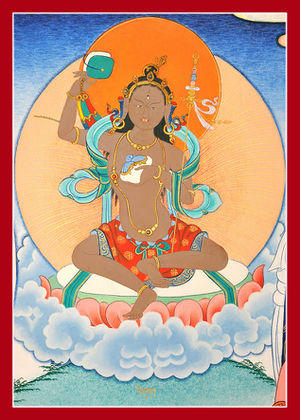Niguma
The wisdom Dakini Niguma was born in Kashmir, India. At that time her father was the Brahmin Shantivarman and her mother was Shrimati. Her brother was the Great Sage Naropa. Other sources state that Niguma was Naropa's consort. However, these sources are in all likelihood mistaken. Sarah Harding, in her excellent treatment of the subject matter, in her 2010 book "Niguma, Lady of Illusion" (Snow Lion), argues very convincingly for the older sister theory. In Niguma's past lives she practiced the path for three immeasurable eons. In this life she came to realization just by meeting a realized lama and receiving a few teachings. Her impure illusory body then arose as perfect body. She dwelt in the three pure states and saw the face of Vajradhara himself. She developed omniscient knowledge and wisdom in the sutras, tantras, oral instructions and teachings and perceived all phenomena as they truly are. For her own benefit, she perfected abandonment and cultivation. For the benefit of others, she manifested the two form bodies and will continue to do so until Samsara is completely empty. Her foremost disciple was the Mahasiddha Khyungpo Naljor, who was born in Tibet and traveled to India to receive the full transmission from her. In granting him the empowerments, Niguma also confirmed that not only he, but also all his successors and followers would in the future have the good fortune to receive the blessing of dakinis, encounter enlightened beings, and attain perfect liberation. Niguma granted the four complete empowerments to the adept Khyungpo Naljor in the emanated mandala and transmitted the most profound tantras, intimate advice, and oral and written teachings. Niguma gave him the essential pith instructions that would enable worthy disciples to attain enlightenment in one lifetime. She promised Khyungpo Naljor that all disciples and Shangpa lineage holders would go to the Pure Land of the Dakini, because this lineage was special above all others. Niguma commanded that for seven generations, these ear-whispered teachings should be only passed on in a one-to-one guru to disciple transmission. From her lifetime to this present day, she continues to manifest whatever subtle or more material form is necessary to benefit beings over limitless time. In particular, through her activity and blessings, she gazes with impartial compassion on all the holders of the Shangpa Kagyu Lineage. Unfortunately we know very little else about Niguma. No extensive historical sources exist, and what other stories we have of her are mainly accounts of visionary encounters with later lineage masters. The very short "biography" of her, if one can call it that, is included in the first volume of the collection of Shangpa texts and was authored by one Mokchokpa. It would of course be easy to immediately jump to the conclusion that this Mokchokpa was Mokchokpa Rinchen Tsondrü, Khyungpo Naljor's main lineage holder. However, as Jamgön Kongtrul points out very clearly in his catalog of the Shangpa texts, "The Beryl Key", the author of this short biography was rather the later Mokchokpa Kunga Ö (rmog lcog pa kun dga' 'od), who also went by the name of Jatang Kunga Yeshe (bya btang kun dga' ye shes), an incarnation of Mokchokpa Rinchen Tsondrü. A certain Nyugla Panchen Ngawang Dragpa (smyug la paN chen ngag dbang grags pa) is said to have written another biography of Niguma, but I have not seen it. [TSD]
Sources: ye shes kyi dA ki ma ni gu ma'i rnam thar, shangs chos, vol. 1, pp. 37-48; Niguma - Lady of Illusion, Sarah Harding, Snow Lion, 2010; oral communications from Kyabje Tenga Rinpoche.
A Song of Niguma
When one realizes that our many thoughts of anger and desire,
which churn the ocean of Samsara,
are devoid of any self-nature,
everything becomes a land of gold, my child.
When one meditates that magiclike phenomena
are all like magical illusions,
one will attain magiclike buddhahood,
[and all of the five paths and ten stages.]*
This, through the power of devotion!
Ithi
Note: This extra line occurs only in a brief history of the Shangpa tradition by Jonang Jetsun Taranatha!
Translated from the Tibetan by Sherab Drime [TSD]
